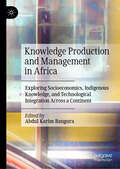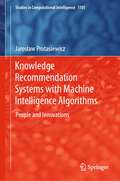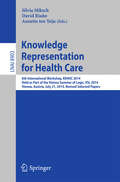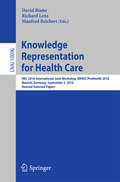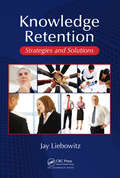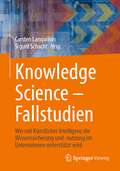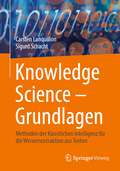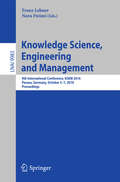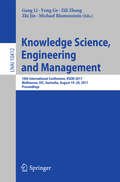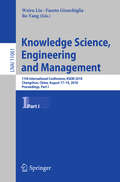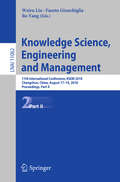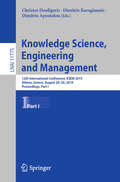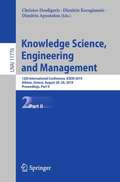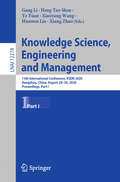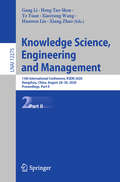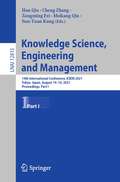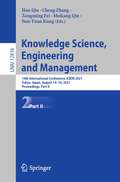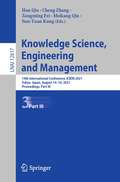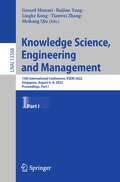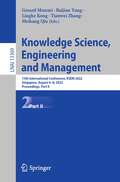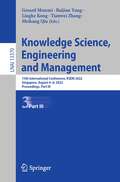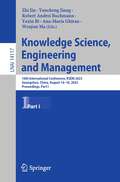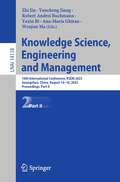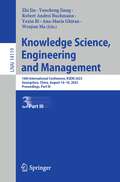- Table View
- List View
Knowledge Production and Management in Africa: Exploring Socioeconomics, Indigenous Knowledge, and Technological Integration Across a Continent
by Abdul Karim BanguraThis contributed volume explores knowledge production and management across diverse African contexts, integrating indigenous perspectives with modern technological advancements. It addresses the intersection of cultural, socioeconomic, and technological factors, offering readers a thorough understanding of how these elements shape knowledge systems in Africa. Structured into five key sections—technology, pedagogy and curricula, business and ecology, culture and community, and human relationships—the book presents a cohesive framework guiding readers through various domains of knowledge production. Each chapter examines specific themes, from AI&’s moral standing and mobile technologies in agriculture to digital transformation in education and the role of performing arts in cultural orientation. The chapters are authored by experts who provide empirical research, case studies, and theoretical analyses, ensuring a rich and diverse exploration of topics. By challenging conventional paradigms and advocating for context-specific approaches, the book highlights the resilience and innovation inherent in African knowledge practices. Readers will gain a deep understanding of the multifaceted nature of knowledge production in Africa. The book highlights culturally-responsive cognitive schemas, the impact of digital technologies on education and business, and the role of indigenous knowledge in sustainable development. Readers will walk away from the book understanding inclusive and effective knowledge management practices, and they will have an enhanced appreciation for the unique contributions of African knowledge systems to global discourses.
Knowledge Recommendation Systems with Machine Intelligence Algorithms: People and Innovations (Studies in Computational Intelligence #1101)
by Jarosław ProtasiewiczKnowledge recommendation is an timely subject that is encountered frequently in research and information services. A compelling and urgent need exists for such systems: the modern economy is in dire need of highly-skilled professionals, researchers, and innovators, who create opportunities to gain competitive advantage and assist in the management of financial resources and available goods, as well as conducting fundamental and applied research more effectively.This book takes readers on a journey into the world of knowledge recommendation, and of systems of knowledge recommendation that use machine intelligence algorithms. It illustrates knowledge recommendation using two examples. The first is the recommendation of reviewers and experts who can evaluate manuscripts of academic articles, or of research and development project proposals. The second is innovation support, which involves bringing science and business together by recommending information that pertains to innovations, projects, prospective partners, experts, and conferences meaningfully.The book also describes the selection of the algorithms that transform data into information and then into knowledge, which is then used in the information systems. More specifically, recommendation and information extraction algorithms are used to acquire data, classify publications, identify (disambiguate) their authors, extract keywords, evaluate whether enterprises are innovative, and recommend knowledge.This book comprises original work and is unique in many ways. The systems and algorithms it presents are informed by contemporary solutions described in the literature - including many compelling, novel, and original aspects. The new and promising directions the book presents, as well as the techniques of machine learning applied to knowledge recommendation, are all original.
Knowledge Representation for Health Care
by David Riaño Silvia Miksch Annette Ten TeijeThis book constitutes the refereed proceedings of the 6th International Workshop on Knowledge Representation for Health Care, KR4HC 2014, held as part of the Vienna Summer of Logic, VSL 2014, in Vienna, Austria, in July 2014. The workshop aimed at attracting the interest of novel research and advances contributing in the definition, representation and exploitation of health care knowledge in medical informatics. The 12 revised full research papers and 4 short papers presented in this book were carefully reviewed and selected from 26 submissions.
Knowledge Representation for Health Care
by David Riaño Richard Lenz Manfred ReichertThis book constitutes the thoroughly refereedpost-workshop proceedings of two workshops held at the International Conferenceon Artificial Intelligence in Medicine, AIME 2015, held in Pavia, Italy, inJune 2015: the 7th International Workshop on Knowledge Representation forHealth Care, KR4HC 2015, and the 8th International Workshop on Process-orientedInformation Systems in Healthcare, ProHealth 2015. The 10 revised full papers were carefullyreviewed and selected from 26 submissions. The papers are organized in topicalsections on knowledge-driven health IT and simulation, clinical guideline andclinical pathway support, mobile process and decision support, and healthinformation systems and clinical data.
Knowledge Representation, Reasoning, and the Design of Intelligent Agents
by Dr Michael Gelfond Yulia KahlKnowledge representation and reasoning is the foundation of artificial intelligence, declarative programming, and the design of knowledge-intensive software systems capable of performing intelligent tasks. Using logical and probabilistic formalisms based on answer set programming (ASP) and action languages, this book shows how knowledge-intensive systems can be given knowledge about the world and how it can be used to solve non-trivial computational problems. The authors maintain a balance between mathematical analysis and practical design of intelligent agents. All the concepts, such as answering queries, planning, diagnostics, and probabilistic reasoning, are illustrated by programs of ASP. The text can be used for AI-related undergraduate and graduate classes and by researchers who would like to learn more about ASP and knowledge representation.
Knowledge Retention: Strategies and Solutions
by Jay LiebowitzAs the baby boomer generation approaches retirement age, many organizations are facing the potential crisis of lost knowledge. Devised to help those organizations who are dependent on the accumulated knowledge of stakeholders, this book details a proactive approach to knowledge retention. Written by Jay Liebowitz, one of the most sought after knowledge management experts, this text explains how to identify at risk knowledge areas, and then demonstrates how to keep those areas from becoming knowledge vacuums. To reinforce his points, the book contains case studies from The Aerospace Corporation, Chevron, and Knowledge Harvesting Inc., who have become models for the implementation of knowledge retention strategies.
Knowledge Science – Fallstudien: Wie mit Künstlicher Intelligenz die Wissenssicherung und -nutzung im Unternehmen unterstützt wird
by Sigurd Schacht Carsten LanquillonDer Arbeitsplatz der Zukunft wird immer stärker durch die Wissensarbeit geprägt. Knowledge Science beschäftigt sich mit Konzepten, Methoden und Prozessen zur systematischen Erzeugung, Extraktion, Speicherung und Bereitstellung von Wissen zur Lösung von Problemen und lässt sich somit dem Wissensmanagement zuordnen. Kognitive Assistenten sorgen dafür, das richtige Wissen zur richtigen Zeit in der richtigen Art und Weise seinen Anwendern und Anwenderinnen bereitzustellen. Damit dies gelingen kann, kommen inzwischen zahlreiche Methoden der Künstlichen Intelligenz (KI) zur Unterstützung unterschiedlicher Aufgaben des Wissensmanagements zum Einsatz.Der InhaltWie lassen sich mit KI-Methoden die Wissenssicherung und Wissensnutzung in Unternehmen unterstützen? Dieses Buch charakterisiert den Arbeitsplatz der Zukunft und stellt die Bedeutung der Ressource Wissen und deren Management in den Vordergrund. Ziel ist es nicht, mittels KI den Menschen zu ersetzen, sondern ihn mittels kognitiver Assistenten bestmöglich bei seiner Arbeit zu unterstützen. Welche Bereiche des Unternehmens können mit Methoden der Künstlichen Intelligenz optimiert oder gänzlich transformiert werden? Welche Schritte sind sowohl organisatorisch als auch technisch notwendig und wie werden einzelne Methoden in den Bereichen tatsächlich durchgeführt? In diesem Buch werden die Methoden der KI anhand konkreter Fallstudien mit einer großen Bandbreite erläutert und entmystifiziert:Assistenzsysteme, die wie ein Mensch lernenWissenssicherung durch Smart Expert Debriefings Kognitive Assistenzsysteme für die Trendanalyse Kognitive Assistenzsysteme im ProjektmanagementMethoden der KI in industriellen AnwendungenDie ZielgruppenUnternehmer, Prozessverantwortliche und Fachanwender, die Methoden der KI in ihrem Unternehmen oder ihren Fachbereichen nutzen wollen.IT-Manager, IT-Experten und Data Scientists, die KI-basierte Lösungen im Wissensmanagement umsetzen Studierende im Bereich KI und Data Science
Knowledge Science – Grundlagen: Methoden der Künstlichen Intelligenz für die Wissensextraktion aus Texten
by Sigurd Schacht Carsten LanquillonKnowledge Science beschäftigt sich mit Konzepten, Methoden und Prozessen zur systematischen Erzeugung, Extraktion, Speicherung und Bereitstellung von Wissen zur Lösung von Problemen und lässt sich somit dem Wissensmanagement zuordnen. Kognitive Assistenten sorgen dafür, das richtige Wissen zur richtigen Zeit in der richtigen Art und Weise seinen Anwendern und Anwenderinnen bereitzustellen. Damit dies gelingen kann, kommen inzwischen zahlreiche Methoden der Künstlichen Intelligenz (KI) zur Unterstützung unterschiedlicher Aufgaben des Wissensmanagements zum Einsatz.
Knowledge Science, Engineering and Management
by Franz Lehner Nora FteimiThis book constitutes the refereed proceedings of the 9th International Conference on Knowledge Science, Engineering and Management, KSEM 2016, held in Passau, Germany, in October 2016. The 49 revised full papers presented together with 2 keynotes were carefully selected and reviewed from 116 submissions. The papers are organized in topical sections on Clustering and Classification; Text Mining and Lexical Analysis; Content and Document Analysis; Enterprise Knowled≥ Formal Semantics and Fuzzy Logic; Knowledge Engineering; Knowledge Enrichment and Visualization; Knowledge Management; Knowledge Retrieval; Knowledge Systems and Security; Neural Networks and Artificial Intelligence; Ontologies; and Recommendation Algorithms and Systems.
Knowledge Science, Engineering and Management: 10th International Conference, KSEM 2017, Melbourne, VIC, Australia, August 19-20, 2017, Proceedings (Lecture Notes in Computer Science #10412)
by Gang Li, Yong Ge, Zili Zhang, Zhi Jin and Michael BlumensteinThis book constitutes the refereed proceedings of the 10th International Conference on Knowledge Science, Engineering and Management, KSEM 2017, held in Melbourne, Australia, in August 2017. The 35 revised full papers and 12 short papers presented were carefully reviewed and selected from 134 submissions. The papers are organized in the following topical sections: text mining and document analysis; formal semantics and fuzzy logic; knowledge management; knowledge integration; knowledge retrieval; recommendation algorithms and systems; knowledge engineering; and knowledge representation and reasoning.
Knowledge Science, Engineering and Management: 11th International Conference, KSEM 2018, Changchun, China, August 17–19, 2018, Proceedings, Part I (Lecture Notes in Computer Science #11061)
by Bo Yang Weiru Liu Fausto GiunchigliaThis two volume set of LNAI 11061 and LNAI 11062 constitutes the refereed proceedings of the 11th International Conference on Knowledge Science, Engineering and Management, KSEM 2018, held in Changchun, China, in August 2018. The 62 revised full papers and 26 short papers presented were carefully reviewed and selected from 262 submissions. The papers of the first volume are organized in the following topical sections: text mining and document analysis; image and video data analysis; data processing and data mining; recommendation algorithms and systems; probabilistic models and applications; knowledge engineering applications; and knowledge graph and knowledge management. The papers of the second volume are organized in the following topical sections: constraints and satisfiability; formal reasoning and ontologies; deep learning; network knowledge representation and learning; and social knowledge analysis and management.
Knowledge Science, Engineering and Management: 11th International Conference, KSEM 2018, Changchun, China, August 17–19, 2018, Proceedings, Part II (Lecture Notes in Computer Science #11062)
by Bo Yang Weiru Liu Fausto GiunchigliaThis two volume set of LNAI 11061 and LNAI 11062 constitutes the refereed proceedings of the 11th International Conference on Knowledge Science, Engineering and Management, KSEM 2018, held in Changchun, China, in August 2018. The 62 revised full papers and 26 short papers presented were carefully reviewed and selected from 262 submissions. The papers of the first volume are organized in the following topical sections: text mining and document analysis; image and video data analysis; data processing and data mining; recommendation algorithms and systems; probabilistic models and applications; knowledge engineering applications; and knowledge graph and knowledge management. The papers of the second volume are organized in the following topical sections: constraints and satisfiability; formal reasoning and ontologies; deep learning; network knowledge representation and learning; and social knowledge analysis and management.
Knowledge Science, Engineering and Management: 12th International Conference, KSEM 2019, Athens, Greece, August 28–30, 2019, Proceedings, Part I (Lecture Notes in Computer Science #11775)
by Dimitris Karagiannis Christos Douligeris Dimitris ApostolouThis two-volume set of LNAI 11775 and LNAI 11776 constitutes the refereed proceedings of the 12th International Conference on Knowledge Science, Engineering and Management, KSEM 2019, held in Athens, Greece, in August 2019. The 77 revised full papers and 23 short papers presented together with 10 poster papers were carefully reviewed and selected from 240 submissions. The papers of the first volume are organized in the following topical sections: Formal Reasoning and Ontologies; Recommendation Algorithms and Systems; Social Knowledge Analysis and Management ; Data Processing and Data Mining; Image and Video Data Analysis; Deep Learning; Knowledge Graph and Knowledge Management; Machine Learning; and Knowledge Engineering Applications.The papers of the second volume are organized in the following topical sections: Probabilistic Models and Applications; Text Mining and Document Analysis; Knowledge Theories and Models; and Network Knowledge Representation and Learning.
Knowledge Science, Engineering and Management: 12th International Conference, KSEM 2019, Athens, Greece, August 28–30, 2019, Proceedings, Part II (Lecture Notes in Computer Science #11776)
by Dimitris Karagiannis Christos Douligeris Dimitris ApostolouThis two-volume set of LNAI 11775 and LNAI 11776 constitutes the refereed proceedings of the 12th International Conference on Knowledge Science, Engineering and Management, KSEM 2019, held in Athens, Greece, in August 2019. The 77 revised full papers and 23 short papers presented together with 10 poster papers were carefully reviewed and selected from 240 submissions. The papers of the first volume are organized in the following topical sections: Formal Reasoning and Ontologies; Recommendation Algorithms and Systems; Social Knowledge Analysis and Management ; Data Processing and Data Mining; Image and Video Data Analysis; Deep Learning; Knowledge Graph and Knowledge Management; Machine Learning; and Knowledge Engineering Applications. The papers of the second volume are organized in the following topical sections: Probabilistic Models and Applications; Text Mining and Document Analysis; Knowledge Theories and Models; and Network Knowledge Representation and Learning.
Knowledge Science, Engineering and Management: 13th International Conference, KSEM 2020, Hangzhou, China, August 28–30, 2020, Proceedings, Part I (Lecture Notes in Computer Science #12274)
by Gang Li Xiang Zhao Ye Yuan Xiaoyang Wang Heng Tao Shen Huawen LiuThis two-volume set of LNAI 12274 and LNAI 12275 constitutes the refereed proceedings of the 13th International Conference on Knowledge Science, Engineering and Management, KSEM 2020, held in Hangzhou, China, in August 2020.*The 58 revised full papers and 27 short papers were carefully reviewed and selected from 291 submissions. The papers of the first volume are organized in the following topical sections: knowledge graph; knowledge representation; knowledge management for education; knowledge-based systems; and data processing and mining. The papers of the second volume are organized in the following topical sections: machine learning; recommendation algorithms and systems; social knowledge analysis and management; text mining and document analysis; and deep learning. *The conference was held virtually due to the COVID-19 pandemic.
Knowledge Science, Engineering and Management: 13th International Conference, KSEM 2020, Hangzhou, China, August 28–30, 2020, Proceedings, Part II (Lecture Notes in Computer Science #12275)
by Gang Li Xiang Zhao Ye Yuan Xiaoyang Wang Heng Tao Shen Huawen LiuThis two-volume set of LNAI 12274 and LNAI 12275 constitutes the refereed proceedings of the 13th International Conference on Knowledge Science, Engineering and Management, KSEM 2020, held in Hangzhou, China, in August 2020.*The 58 revised full papers and 27 short papers were carefully reviewed and selected from 291 submissions. The papers of the first volume are organized in the following topical sections: knowledge graph; knowledge representation; knowledge management for education; knowledge-based systems; and data processing and mining. The papers of the second volume are organized in the following topical sections: machine learning; recommendation algorithms and systems; social knowledge analysis and management; text mining and document analysis; and deep learning. *The conference was held virtually due to the COVID-19 pandemic.
Knowledge Science, Engineering and Management: 14th International Conference, KSEM 2021, Tokyo, Japan, August 14–16, 2021, Proceedings, Part I (Lecture Notes in Computer Science #12815)
by Meikang Qiu Han Qiu Cheng Zhang Zongming Fei Sun-Yuan KungThis three-volume set constitutes the refereed proceedings of the 14th International Conference on Knowledge Science, Engineering and Management, KSEM 2021, held in Tokyo, Japan, in August 2021.The 164 revised full papers were carefully reviewed and selected from 492 submissions. The contributions are organized in the following topical sections: knowledge science with learning and AI; knowledge engineering research and applications; knowledge management with optimization and security.
Knowledge Science, Engineering and Management: 14th International Conference, KSEM 2021, Tokyo, Japan, August 14–16, 2021, Proceedings, Part II (Lecture Notes in Computer Science #12816)
by Meikang Qiu Han Qiu Cheng Zhang Zongming Fei Sun-Yuan KungThis three-volume set constitutes the refereed proceedings of the 14th International Conference on Knowledge Science, Engineering and Management, KSEM 2021, held in Tokyo, Japan, in August 2021.The 164 revised full papers were carefully reviewed and selected from 492 submissions. The contributions are organized in the following topical sections: knowledge science with learning and AI; knowledge engineering research and applications; knowledge management with optimization and security.
Knowledge Science, Engineering and Management: 14th International Conference, KSEM 2021, Tokyo, Japan, August 14–16, 2021, Proceedings, Part III (Lecture Notes in Computer Science #12817)
by Meikang Qiu Han Qiu Cheng Zhang Zongming Fei Sun-Yuan KungThis three-volume set constitutes the refereed proceedings of the 14th International Conference on Knowledge Science, Engineering and Management, KSEM 2021, held in Tokyo, Japan, in August 2021.The 164 revised full papers were carefully reviewed and selected from 492 submissions. The contributions are organized in the following topical sections: knowledge science with learning and AI; knowledge engineering research and applications; knowledge management with optimization and security.
Knowledge Science, Engineering and Management: 15th International Conference, KSEM 2022, Singapore, August 6–8, 2022, Proceedings, Part I (Lecture Notes in Computer Science #13368)
by Meikang Qiu Linghe Kong Gerard Memmi Baijian Yang Tianwei ZhangThe three-volume sets constitute the refereed proceedings of the 15th International Conference on Knowledge Science, Engineering and Management, KSEM 2022, held in Singapore, during August 6–8, 2022. The 169 full papers presented in these proceedings were carefully reviewed and selected from 498 submissions. The papers are organized in the following topical sections:Volume I: Knowledge Science with Learning and AI (KSLA)Volume II: Knowledge Engineering Research and Applications (KERA)Volume III: Knowledge Management with Optimization and Security (KMOS)
Knowledge Science, Engineering and Management: 15th International Conference, KSEM 2022, Singapore, August 6–8, 2022, Proceedings, Part II (Lecture Notes in Computer Science #13369)
by Meikang Qiu Linghe Kong Gerard Memmi Baijian Yang Tianwei ZhangThe three-volume sets constitute the refereed proceedings of the 15th International Conference on Knowledge Science, Engineering and Management, KSEM 2022, held in Singapore, during August 6–8, 2022. The 169 full papers presented in these proceedings were carefully reviewed and selected from 498 submissions. The papers are organized in the following topical sections:Volume I:Knowledge Science with Learning and AI (KSLA)Volume II:Knowledge Engineering Research and Applications (KERA)Volume III:Knowledge Management with Optimization and Security (KMOS)
Knowledge Science, Engineering and Management: 15th International Conference, KSEM 2022, Singapore, August 6–8, 2022, Proceedings, Part III (Lecture Notes in Computer Science #13370)
by Meikang Qiu Linghe Kong Gerard Memmi Baijian Yang Tianwei ZhangThe three-volume sets constitute the refereed proceedings of the 15th International Conference on Knowledge Science, Engineering and Management, KSEM 2022, held in Singapore, during August 6–8, 2022. The 169 full papers presented in these proceedings were carefully reviewed and selected from 498 submissions. The papers are organized in the following topical sections:Volume I:Knowledge Science with Learning and AI (KSLA)Volume II:Knowledge Engineering Research and Applications (KERA)Volume III:Knowledge Management with Optimization and Security (KMOS)
Knowledge Science, Engineering and Management: 16th International Conference, KSEM 2023, Guangzhou, China, August 16–18, 2023, Proceedings, Part I (Lecture Notes in Computer Science #14117)
by Yaxin Bi Zhi Jin Robert Andrei Buchmann Wenjun Ma Yuncheng Jiang Ana-Maria GhiranThis volume set constitutes the refereed proceedings of the 16th International Conference on Knowledge Science, Engineering and Management, KSEM 2023, which was held in Guangzhou, China, during August 16–18, 2023. The 114 full papers and 30 short papers included in this book were carefully reviewed and selected from 395 submissions. They were organized in topical sections as follows: knowledge science with learning and AI; knowledge engineering research and applications; knowledge management systems; and emerging technologies for knowledge science, engineering and management.
Knowledge Science, Engineering and Management: 16th International Conference, KSEM 2023, Guangzhou, China, August 16–18, 2023, Proceedings, Part II (Lecture Notes in Computer Science #14118)
by Yaxin Bi Zhi Jin Robert Andrei Buchmann Wenjun Ma Yuncheng Jiang Ana-Maria GhiranThis volume set constitutes the refereed proceedings of the 16th International Conference on Knowledge Science, Engineering and Management, KSEM 2023, which was held in Guangzhou, China, during August 16–18, 2023. The 114 full papers and 30 short papers included in this book were carefully reviewed and selected from 395 submissions. They were organized in topical sections as follows: knowledge science with learning and AI; knowledge engineering research and applications; knowledge management systems; and emerging technologies for knowledge science, engineering and management.
Knowledge Science, Engineering and Management: 16th International Conference, KSEM 2023, Guangzhou, China, August 16–18, 2023, Proceedings, Part III (Lecture Notes in Computer Science #14119)
by Yaxin Bi Zhi Jin Robert Andrei Buchmann Wenjun Ma Yuncheng Jiang Ana-Maria GhiranThis volume set constitutes the refereed proceedings of the 16th International Conference on Knowledge Science, Engineering and Management, KSEM 2023, which was held in Guangzhou, China, during August 16–18, 2023. The 114 full papers and 30 short papers included in this book were carefully reviewed and selected from 395 submissions. They were organized in topical sections as follows: knowledge science with learning and AI; knowledge engineering research and applications; knowledge management systems; and emerging technologies for knowledge science, engineering and management.
